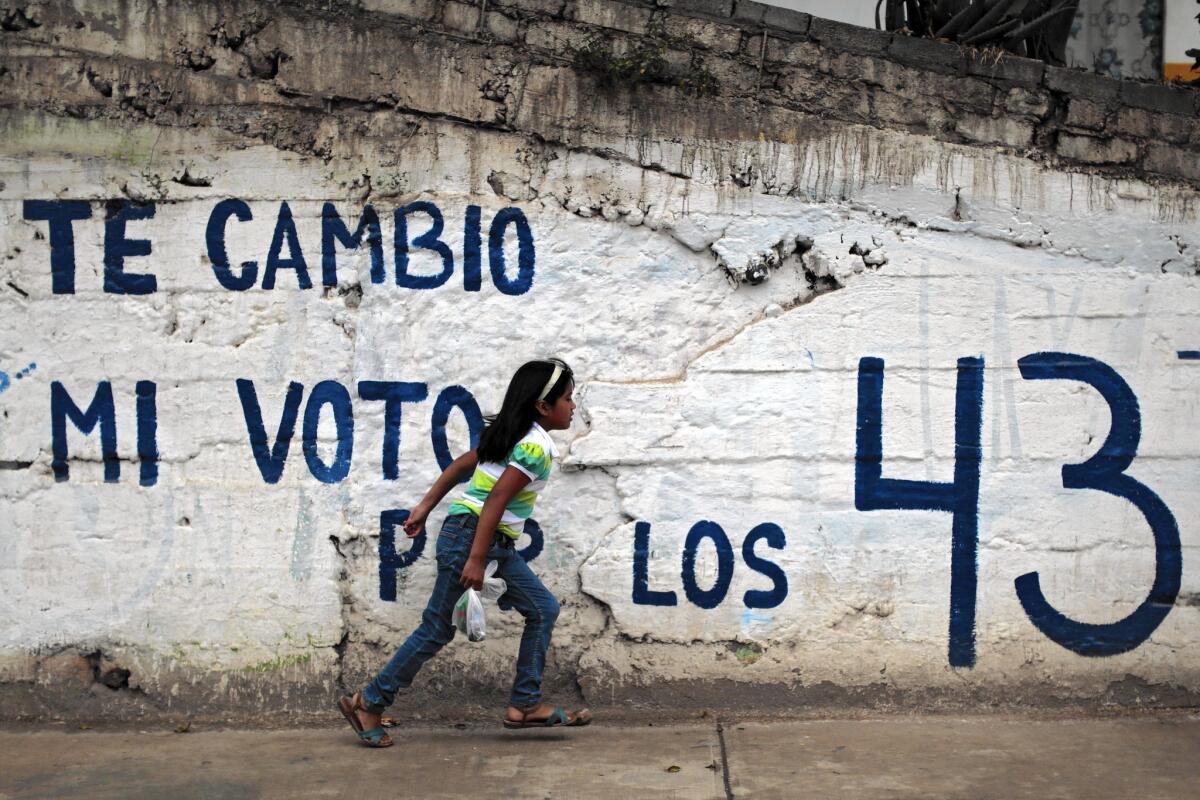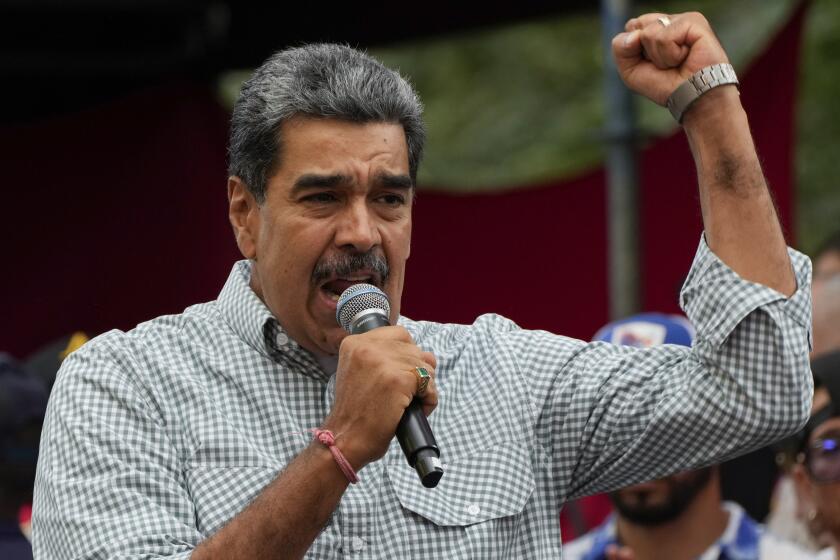Violence, boycotts loom on eve of Mexico’s elections

On the eve of nationwide elections in Mexico, demonstrators have laid siege to election board offices, torched ballots and vowed to otherwise disrupt voting as public anger at the government and the political establishment boils over.
A movement is also afoot among some Mexicans to boycott the vote or deliberately invalidate ballots cast in Sunday’s midterm elections, which will choose nine state governors, 16 state legislatures, 500 members of the federal Congress and 887 mayors.
Paradoxically, the protests will probably only benefit the party that many demonstrators seek to punish: the ruling Institutional Revolutionary Party, or PRI, of President Enrique Peña Nieto, as well as some of the large unions.
The well-organized and well-financed PRI is always able to deliver a solid base of voters in any election and is expected to do so again. Ditto for unions that many blame for stifling the political system.
“If those of us who are most critical stop playing … we leave the decisions in the hands of those we least want to make decisions,” Viridiana Rios, head of a civic organization called Mexico, Como Vamos? (Mexico, how are we doing?), said in a television program dedicated to the elections.
For the first time, however, independent candidates not affiliated with a party are being allowed to participate, and one or two just might give the PRI a run for the money.
The PRI, which ruled Mexico with a heavy hand for seven decades until finally being unseated in 2000, returned to presidential power in 2012 with lofty plans for great reforms that would modernize Mexico, from its ossified education system to the underperforming energy sector.
Those reforms have stalled. Most controversially, the government last week caved on the education reform, which would have required evaluations of teachers’ skills, in hope of quieting violent protests by members of a radical teachers’ union. The union members had announced their intention to stop elections in the states of Oaxaca and Guerrero, and the government decided to sacrifice what many Mexicans believed to be the most important reform in terms of transforming the nation.
Disaffection with the government has been compounded by a sluggish economy, corruption scandals and several suspicious mass killings attributed to authorities, including the case of 43 rural college students rounded up by police eight months ago and never seen again, save for a bone fragment from one student found in a mass grave.
It is the violence that has grabbed headlines in the days leading up to the election. Three candidates were assassinated in the last month, and another was beheaded in March. Others have been threatened or temporarily kidnapped. By one count, 19 people were slain in incidents directly connected to the campaign season, which started in February.
Peña Nieto’s government says the violence that has spread through at least seven states represents “isolated incidents.” The National Electoral Institute, which oversees all balloting, said the situation was “delicate” but not “an emergency,” while acknowledging it may not be able to open voting stations in some areas.
“We have cases that we profoundly lament,” Interior Minister Miguel Angel Osorio Chong said recently. “But our country is not in flames.”
After several government offices were burned, the Interior Ministry entered negotiations with the rebellious teachers’ union and appeared to have reached some agreement. But union leader Ruben Nuñez said Thursday that his group would push ahead with a boycott of “the electoral farce.”
Regardless, elections will be held Sunday, and polls suggest that the PRI, despite public discontent, will make gains across the board, including possibly taking a large enough majority in Congress to be able to pass legislation and budgets without challenge.
Because of the scandals and security disasters, Peña Nieto’s approval ratings have hit their lowest. In many countries, such as the United States, a midterm election would be used to punish the ruling party.
But in Mexico, the opposition is weak. The left is deeply fragmented and reeling from the role of some of its politicians in the presumed massacre of the 43 students. The National Action Party on the right is still suffering from disapproval of former President Felipe Calderon’s handling of the drug war, which has cost tens of thousands of lives.
One blip in any PRI plans for hegemony might come from the odd candidacy of a man calling himself El Bronco, an untamed steed who bucks the system.
Jaime Rodriguez is taking advantage of a change in electoral rules that this year allows individuals to run for office without belonging to a party. The longtime member of the PRI is running as an independent for the governorship of Nuevo Leon, the northern border state that is the center of much of the country’s wealth and industry and is currently controlled by the PRI. And, although some worry about his swaggering, caudillo tendencies, he stands a good chance of winning, according to several polls.
In the rally closing his campaign last weekend, Rodriguez hit all the populist chords that marked his candidacy and set him apart from business-as-usual politics, offering to rent with his own money an apartment instead of using the governor’s palace and saying he would refuse to spend millions, as governors typically do, on propaganda promoting their states and themselves.
A refrain he repeated often during the campaign, especially on his very active Facebook and Twitter accounts, also hit a nerve: “One dead son, one kidnapped 2-year-old daughter and 2,800 bullet holes in my truck,” recounting his own family’s suffering at the hands of criminal gangs.
If Rodriguez prevails, he will shake the political system to the core, analysts say.
“The appearance of an independent candidate with real possibilities of winning is something that has never before been seen in the country,” the Parametrica polling agency said in an analysis.
And the PRI is clearly nervous, pulling out all the stops for the closing rally of its gubernatorial candidate in Nuevo Leon, Ivonne Alvarez. In addition to giving away tons of food and T-shirts, the PRI offered a free performance by the much-beloved — and extremely expensive — Los Tigres del Norte musical band.
In addition to El Bronco, these elections include numerous unusual candidates, some with newly formed parties, whose presence reflects public disaffection with traditional politicians. They include a reality TV star, a famous soccer player, a clown and the former commander of an armed civilian rebellion.
Cecilia Sanchez of The Times’ Mexico City bureau contributed to this report.
Twitter: @TracyKWilkinson
More to Read
Sign up for Essential California
The most important California stories and recommendations in your inbox every morning.
You may occasionally receive promotional content from the Los Angeles Times.











